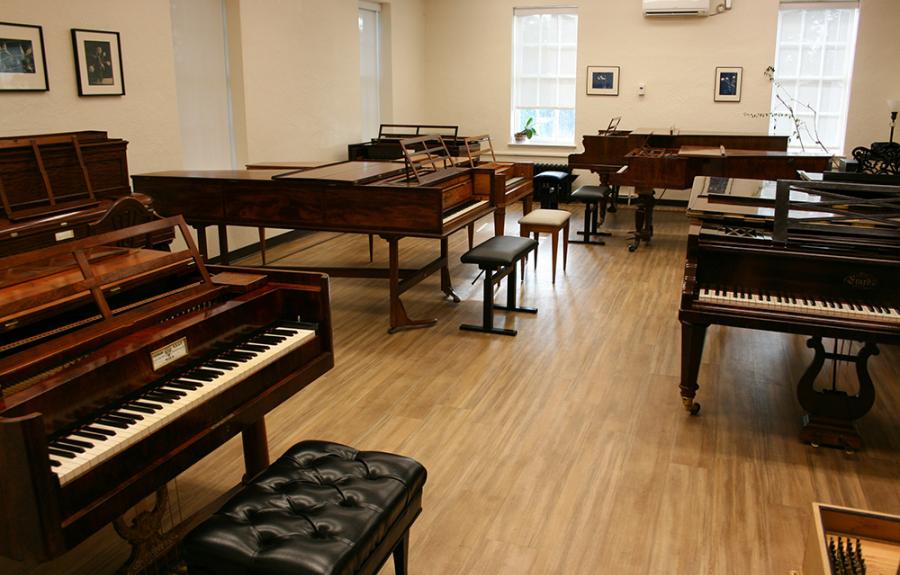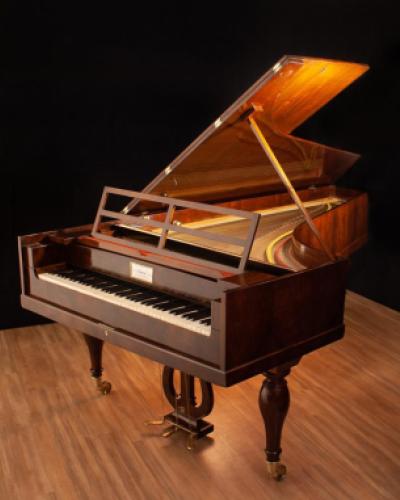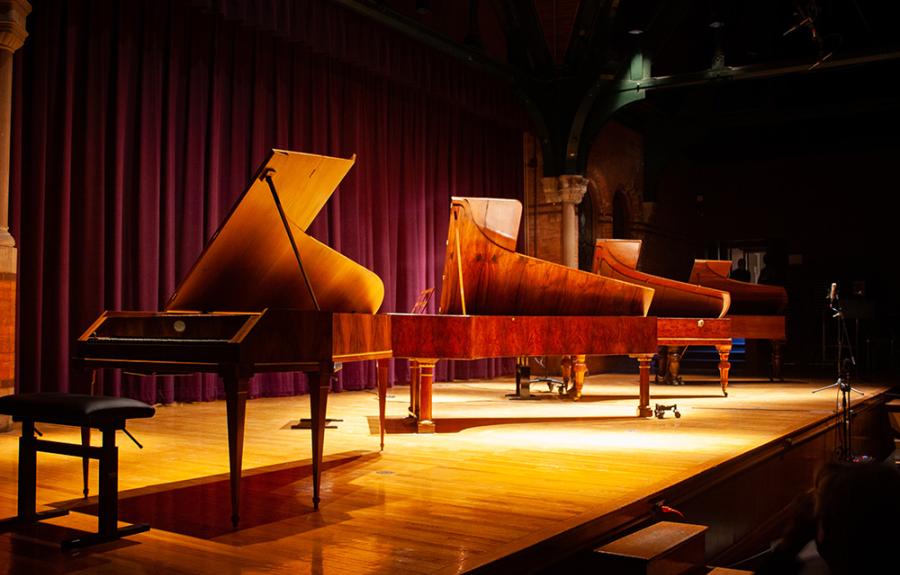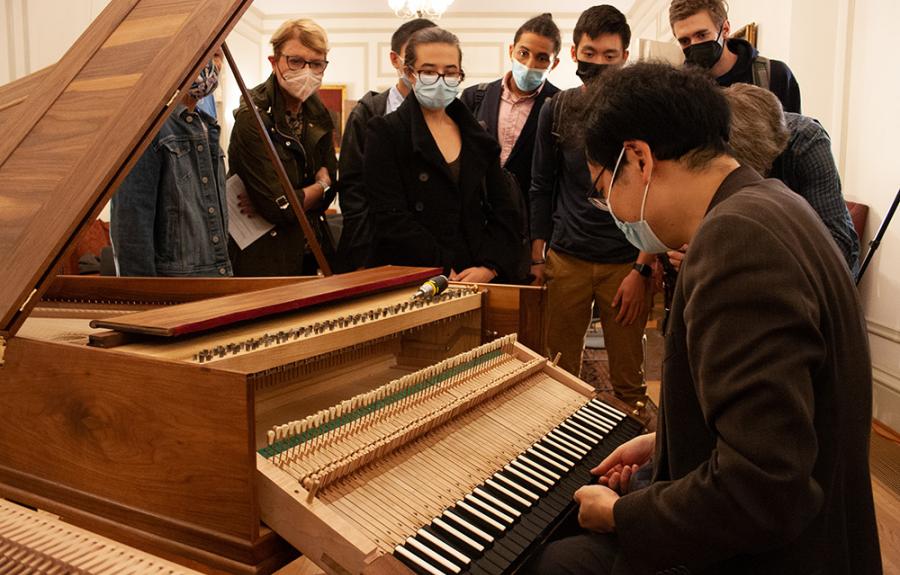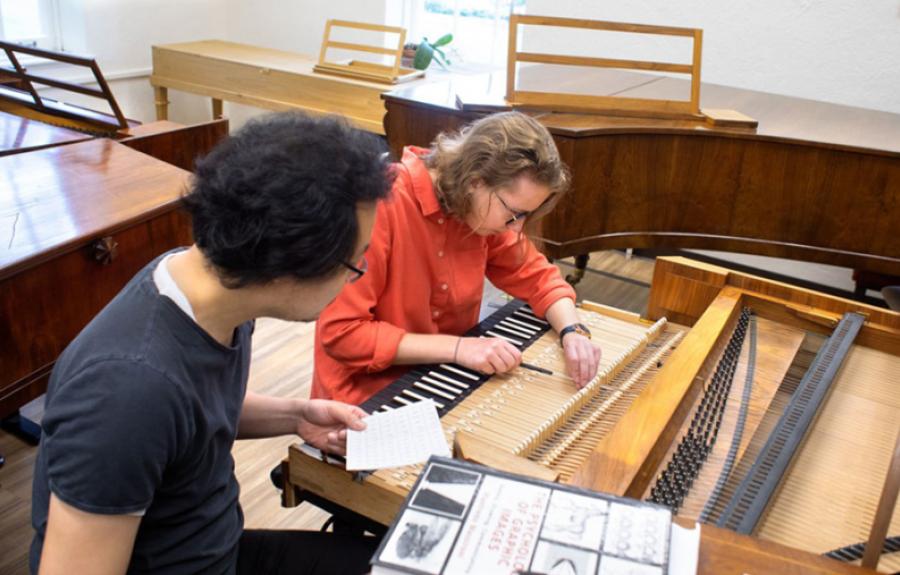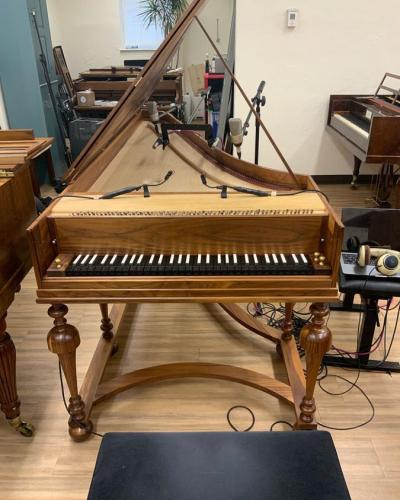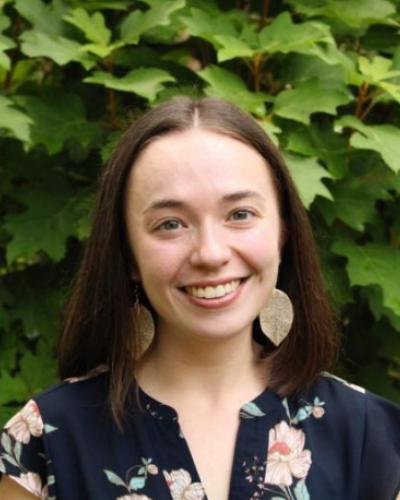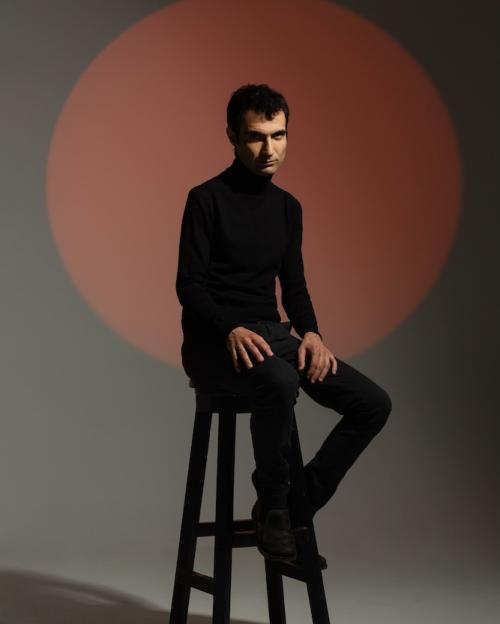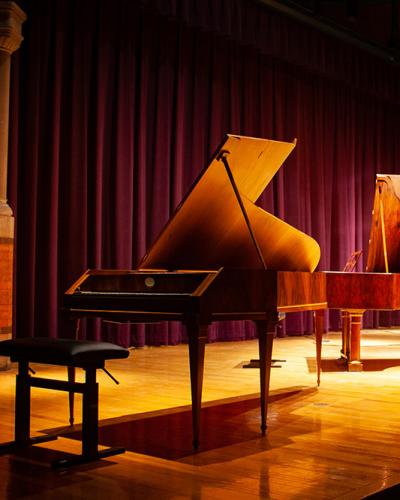Overview
The Cornell Center for Historical Keyboards had another busy, productive and exciting year in 2021. Complicated and difficult in some ways (thanks to COVID-19) it was a year of consolidation and growth. For the Fall semester, the campus was largely open for in-person instruction and the Center was able, for the first time since the onset of the pandemic, to have a consistent in-person presence on the university campus, deepening its connections with undergraduates, community members, and those beyond Cornell.
While the Center continues to foster a growing national and international audience online (an unanticipated benefit of the pandemic), it is expanding the ways it functions as a resource for students at Cornell. Programming this year has emphasized diversity and variety, from intimate sessions at the instruments in 726 University Avenue to larger-scale events in the concert hall, from the organ gallery of Anabel Taylor Chapel to the drawing room of the A. D. White House, crossing historical periods and musical genres. The Center has established a new partnership with the Society for the Humanities for a regular ‘Salon’ series at the A. D. White House. Aiming to deepen collaborations and broaden its reach into the local Ithaca community as well as nationally, the Center's personnel have worked with colleagues beyond Cornell through the Westfield Center for Historical Keyboard Studies and the Mellon-funded Central New York Humanities Corridor, as well as the College of Arts and Sciences at Cornell.
Spring and Fall 2021
The “Beethoven: Off the Beaten Path” series of performances and conversations begun in Fall 2020 continued, on-line, through April, with performances and discussions of Beethoven’s Bagatelles Op. 126 (played by visiting lecturer Ji-Young Kim on the center’s Regier-Graf piano); of the Sonata in F Minor, Op. 57 (“Appassionata”) by played by artist-in-residence Mike Lee on the 1799 Broadwood; of connections between Beethoven and C. P. E. Bach with performances by Mike and a zoom conversation between Mike and Center director Annette Richards.
In parallel, a new series began, “Future Imperfect: Brahms and the Passage of Time,” focusing on the 1857 J. B. Streicher piano which closely resembles the instrument Brahms owned from the 1860s until his death. The series opened with two performances of the Op. 8 piano trio: first, in its rarely-heard early version (1854) performed by Cornell visiting faculty violinist Rebecca Anderson, cellist John Haines-Eitzen and pianist Roger Moseley (on the Streicher), and then in its revised 1889 version, with guests Miriam Fried (violin), Clancy Newman (cello) and Cornell faculty member Miri Yampolsky (on an early 20th-century Steinway). The series continued with a performance by Malcolm Bilson of the A major Intermezzo, Op. 118 No.2, and included a roundtable discussion with musicologist Jacquelyn Sholes (University of Rochester) exploring Brahms’s early pianism and its incorporation of allusions to preexisting music.
The series continued with live performances in the fall, including a reprise of the performance of the original 1854 version of Brahms’ Op. 8 Piano Trio, and then the presentation of two variation cycles – on a theme by Robert Schumann, Op. 9 and the Handel variations, Op. 24 (performed by Ji-Young Kim and Mike Lee) – that explore Brahms’ special relationship with Clara Schumann through the lens of the 1835 Simon piano, an instrument that closely relates to the Schumanns’ Graf that Brahms inherited.
The year concluded with a sense that the center is a truly collaborative enterprise, a hub that draws together diverse members of the Cornell Music Department. In December a gala concert not only showcased five of the most prized instruments – including the recently rebuilt 1843 (“Chopin”) Pleyel, the 1825 Graf and others – but more importantly the event was testament to how far keyboard studies have evolved at Cornell since its early focus on the late 18th century, and the pivotal role the center now occupies in this continued progression. The richness and diversity of keyboard culture at Cornell was evident from the program which included contributions from faculty and students alike who work with keyboard instruments and its cultures from vastly different perspectives, specializations, traditions, and approaches.
The gala was also an opportunity to celebrate the retirement of Cornell's piano technician of forty years, Ken Walkup. Both in his honor and as a way to jump-start the next phase of the CCHK research program, a mini-symposium was held on the often-vexing issues of instrument restoration/conservation, curatorial practices, and how these intersect with the broader concerns of material culture and sustainability. Invited guests for this symposium included Kenneth Slowik (curator of musical instruments at the Smithsonian Institution) and master piano restorer and historian Ken Eschete.
The regular Wednesday lunchtime series Midday Music for Organ continued online for the Spring semester, bringing organ music and the work of Cornell faculty and students to a broad audience at Cornell and beyond. David Yearsley reimagined the flair of Handel as organist, on the Cornell Baroque Organ, in a program of transcriptions and adaptations that was paralleled, later in the semester, by a performance of equal virtuosity presenting music for mechanical organ by Mozart, Haydn, and Beethoven; doctoral student Michael Plagerman offered French and American Romantic music on the French 19th-century style organ at St. Luke Lutheran church in Collegetown; while doctoral student Anna Steppler and Annette Richards at the baroque organ in Anabel Taylor focused on 17th-century Europe and, in particular, the work of the Dutch organist composer Jan Pieterszoon Sweelinck whose death in 1621 was commemorated across the year. In a program in early April, Annette brought her audience (virtually) into the beloved interior of Sage Chapel for a recital entitled ‘The Woods so Wild:’ the vines and leaves of the beautiful decoration of the space formed the backdrop for a program of 17th-century music invoking the natural world.
In the Fall, with the return of live performances but with the Aeolian-Skinner organ still unavailable, attention was focused on an expanded semester-long festival of concerts loosely based around the figure of Sweelinck and celebrating the multifaceted music of the Northern European baroque (with the inclusion of new music, too, to remind audiences of the continuing liveliness of composition even for ‘old’ instruments). At Midday Music for Organ audiences heard music for organ and viol da gamba by Sweelinck’s 16th- and 17th-century English contemporaries (on the Italian organ in Sage with Anna Steppler and guest Zoe Weiss), Sweelinck’s own music on the Anabel Taylor organ and a Klop chamber organ owned (and performed on) by community member Jeff Snedeker, complex music by Sweelinck and his Catholic northern European contemporaries from David Yearsley. Large-scale concerts at the heart of the festival, “The Orpheus of Amsterdam” brought guests Jonathan Schakel (organ and harpsichord), Megan Sharp (voice) and Martin Davids (baroque violin). For many listeners the festival was a first-encounter with a magnificent, though for many unknown, culture of musical experimentation, contrapuntal ingenuity, and moving expressivity.
A key component of the Fall semester’s organ offerings was the Music 2244 class taught by Annette Richards and David Yearsley, with a full enrollment of 40 students. Most of those students were non-majors, many of them in Engineering, and all enthusiastically engaged with the history, art, and technology of the organ. Several have gone on to take studio organ lessons, and to form a new student club, ‘The Organ Club,’ in which they will continue to learn about this fascinating instrument and its history, and to bring it to their peers.
The Keyboard Salon
A new venture, the “Friday Salons at the A. D. White,” was designed to reach a new audience of students and community members. In an informal atmosphere, music, instruments, research, and conversation come together: in a compact, hour-long format (often performed twice, to meet audience demand), highly crafted programs of performances and lectures spotlight an instrument from the collection. Notable Salons so far include a recital of Bach and Haydn on a new copy of a 1749 Silbermann piano (gift of Malcolm Bilson) by artist-in-residence Mike Lee, a lecture-recital on Chopin’s famously troubled months in Majorca in 1838-39 featuring the Pleyel pianino much like the one that was sent to Chopin from Paris from the Pleyel firm, and a Brahms variations recital that juxtaposed two contrasting variation sets by Brahms dedicated to Clara Schumann. The format encourages active engagement, offering opportunities for people to see, touch, and hear the instruments close up, opening up conversation across disciplines, and among audience members of diverse backgrounds, ages, and interests.
Student summer internship
As part of the Center's efforts to expand its reach to undergraduate students, Elizaveta (Liza) Zabelina, served as a student intern over the summer. Liza, a double major in physics and philosophy who had been taking weekly piano lessons with artist-in-residence Mike Lee in the keyboard gallery, developed a lively enthusiasm for the work, and has since brought many friends and classmates into the orbit of historical keyboards at Cornell. With Annette Richards’ sponsorship, Liza applied for and won the highly competitive Cornell Summer Experience Grant which funded her summer internship. With her skills in the sciences and under the guidance of Mike, Liza helped regulate and re-string several of our instruments and developed a photo setup that produced high-quality photographs of roughly a third of our collection. The internship drew the attention of the university media department and resulted in a news article in the Cornell Chronicle as well as a film feature.
Teaching and Usage of Keyboard Gallery Space
The space at 726 University Avenue saw extensive use throughout 2021. During the Spring semester when the university did not host external visitors, the resources of the center were shared with those outside Cornell through digital technology. Over the span of four weeks, Mike presented four lecture-recitals for a concert presenter in south Florida. Each week subscribers received a new video performance of a Beethoven sonata on an instrument appropriate to the work followed by an exclusive Zoom lecture-conversation whereby the subscribers could interact live with the keyboard collection. At the invitation of the renowned pianist and pedagogue Jeffrey Kahane, Mike additionally gave a guest lecture for graduate pianists at the Thornton School of Music, University of Southern California, which afforded an opportunity for professional students to witness and interact with our instruments virtually.
The Fall semester saw a dramatic increase of activity in the keyboard gallery, owing in part to Cornell’s having found safe ways to make in-person instruction possible. A highlight of the semester was when a group of graduate piano students, hailing from both Asia and Europe, led by Prof. Alon Goldstein of the University of Missouri-Kansas City came to work with Prof. Emeritus Malcolm Bilson over the span of three days. In the words of Goldstein, “[Prof. Bilson] brought to life these instruments and the language in a way I have never experienced before. We were in awe!”
In addition to more nearly-regular undergraduate and graduate teaching activities, other notable events in the keyboard gallery include a special visit by Hans Bethe residential house students led by house professor Andrew Hicks (Associate Professor of Music). On this occasion Mike was engaged to speak as part of the Bethe “Ansatz” class about what gives his work and life meaning. Mike gave a presentation for the students that related the art and craft of acting to that of musical interpretation of old music, but with the latter having an added historical dimension that involves a “leap of faith” comparable to that of a mathematical Ansatz. Several students from the session became regular attendees at subsequent CCHK campus events.
Outreach
2021 also saw the CCHK forge partnerships with musicians and musical organizations that broadened the reach of its work and world-class instrument collection. In the fall a collaboration with the Harvard Musical Association engaged Ryan McCullough (Cornell DMA 20’) and Lucy Fitz Gibbon (current interim director of vocal studies) in a performance of Brahms songs. The CCHK sponsored the event in Boston with the loan of the prized 1857 J. B. Streicher. The recital received a very positive review in the Boston Musical Intellingencer.
Other collaborations included the recorded performance of Brahms chamber music by renowned violinist Miriam Fried, professor of violin at the New England Conservatory of Music, and Naumburg Prize-winning cellist Clancy Newman. It is significant that both, being performers on “modern” instruments, showed interest not merely in the historical instruments, but in the critical-historical approaches which form the intellectual backbone of the Center's missions.
Instrument matters
This year saw the successful rebuild of the 1843 Pleyel, generously gifted by Mark Kroll. When the instrument first came to Cornell, it suffered structural issues that made it unplayable but nonetheless revealed itself to harbor great promise. In the summer Malcolm Bilson generously provided the funds and invited master-rebuilder Ken Eschete to rebuild the piano in close collaboration with in-house technician, Ken Walkup. The work proved to be a success and was subsequently unveiled by Malcolm at the end-of-year gala concert. This year also saw Malcolm gifting two more of his personal instruments to the center: a copy of a 1749 Silbermann by Paul McNulty and a ca. 1800 Schantz copy by Thomas and Barbara Wolf.
2021 was an important year for the Aeolian-Skinner organ. In September, all the pipes of the instrument were removed for a long overdue cleaning by Parsons Pipe Organ Company of Bristol, NY. With the pipes out, access could at last be gained to the Positive and Pedal divisions to complete the releathering work on the organ. The chests and pipes have now been reinstalled, and voicing and tuning will be completed in February 2022.
Closing
The CCHK continues to be involved in many of the ongoing teaching and research agendas of the Cornell Department of Music. The center will be a sponsor and resource for several undergraduate and graduate courses, including undergraduate theory, doctoral seminar in keyboard performance practices, and a new course on instrument building led by incoming composition faculty Elizabeth Ogonek. The first small grant awardee, electronic music composition graduate student Joshua Biggs, is currently on track to complete their proposed project that involves creating a sonic archive of select instruments from the center’s collection which will allow anyone with a MIDI controller to perform on a near-exact sonic replica of the instruments.
Several initiatives were made to promote the Center's presence on the Cornell campus. A new range of quarter cards will be distributed at our events, and a new pair of banners will soon adorn the front facia of the building that houses the keyboard gallery. Additionally, the Center is now in the process of transitioning to a Cornell-based website hosted by the College of Arts and Sciences. The new platform will enable the hosting of more substantive content and regular updates, and to enhance user experience around the world.

